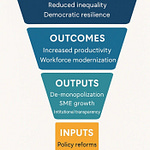Present situational turmoils are a matrix of ethnopolitical struggles for dominance and control of national wealth within an ethnocapitalism environment.
Here's a selective reference list in understanding Malaysia's political turmoil, focusing on the intersections of ethnocracy, ethnocapitalism, and the struggle for dominance over national wealth:
Books and Edited Volumes
1. Chin, J. (2019). Malaysia Post-Mahathir: A Decade of Change? Marshall Cavendish.
Examines the dynamics of Malaysian politics post-Mahathir's first retirement, touching on identity politics and power struggles.
2. Gomez, E. T., & Jomo, K. S. (1999). Malaysia’s Political Economy: Politics, Patronage and Profits. Cambridge University Press.
Explores the relationship between politics, business, and ethnic dominance in Malaysia's political economy.
3. Gale, B. (1981). Politics and Public Enterprise in Malaysia. Oxford University Press.
Analyzes Malaysia's state-controlled economy and its intersection with ethnic policies.
4. Barraclough, S. (1984). Arms and the State in Malaysia: Nationalism, Ethnicity, and Security. Westview Press.
Investigates the role of nationalism and ethnicity in state security and political dynamics.
5. Shamsul, A. B. (2001). Making Sense of the Development and Nation-Building Discourse in Malaysia. National University of Malaysia Press.
A critical analysis of nation-building efforts shaped by ethnic politics.
Articles and Journals
6. Case, W. (1995). "Malaysia: Aspects and Audiences of Legitimacy." Political Science Quarterly, 110(3), 495–513.
Examines the mechanisms of legitimacy in Malaysia's political system, particularly through the lens of ethnocracy.
7. Searle, P. (1999). "Ethnopolitics and the Malaysian State." Southeast Asian Studies, 37(2), 1–29.
Discusses the ethnic dimensions of Malaysia’s state politics and its economic implications.
8. Gomez, E. T. (2007). "Ethnic-based Affirmative Action Policy in Malaysia: Class and State Intersections." Economic and Political Weekly, 42(41), 3555–3562.
Critically examines affirmative action policies and their economic impact within a class framework.
Theoretical Frameworks
9. Foster, J. B., & Magdoff, F. (2009). The Great Financial Crisis: Causes and Consequences. Monthly Review Press.
Offers insight into financialization and global capitalism, which can be applied to understanding Malaysia’s monopoly-finance capitalism.
10. Gramsci, A. (1971). Selections from the Prison Notebooks. Lawrence & Wishart.
Provides foundational concepts of hegemony and state coercion, relevant to Malaysia’s ethnocracy and governance.
11. Poulantzas, N. (1978). State, Power, Socialism. Verso.
Examines the role of the state in capitalist societies, useful for understanding Malaysia’s political economy.
12. Lefebvre, H. (1991). The Production of Space. Blackwell.
Addresses how political and social forces shape urban and national spaces, relevant to Malaysia's socio-political tensions.
Reports and Policy Analyses
13. Malaysian Communications and Multimedia Commission (MCMC) Reports.
Provides insights into the state's control over media and information, linking to surveillance capitalism.
14. Institute for Democracy and Economic Affairs (IDEAS) Malaysia Reports.
Explores policy recommendations and critiques of Malaysia's governance and economic management.
15. United Nations Development Programme (UNDP) Malaysia Reports.
Focuses on human development indices and governance issues in Malaysia, intersecting with national wealth redistribution.
News and Opinion Pieces
16. Malaysiakini (www.malaysiakini.com)
Offers diverse perspectives on current political events and ethnocratic struggles.
17. The Edge Malaysia (www.theedgemarkets.com)
Provides analysis on economic and corporate developments tied to Malaysia's political economy.
18. Asia Sentinel (www.asiasentinel.com)
Independent journalism on Southeast Asia, often featuring critical insights into Malaysia's political developments.
Thank you for reading our article postings, viewing the videos and listening to podcasts.
with solidarity.
Please continue to support our research-writings and vizual & audio productions














